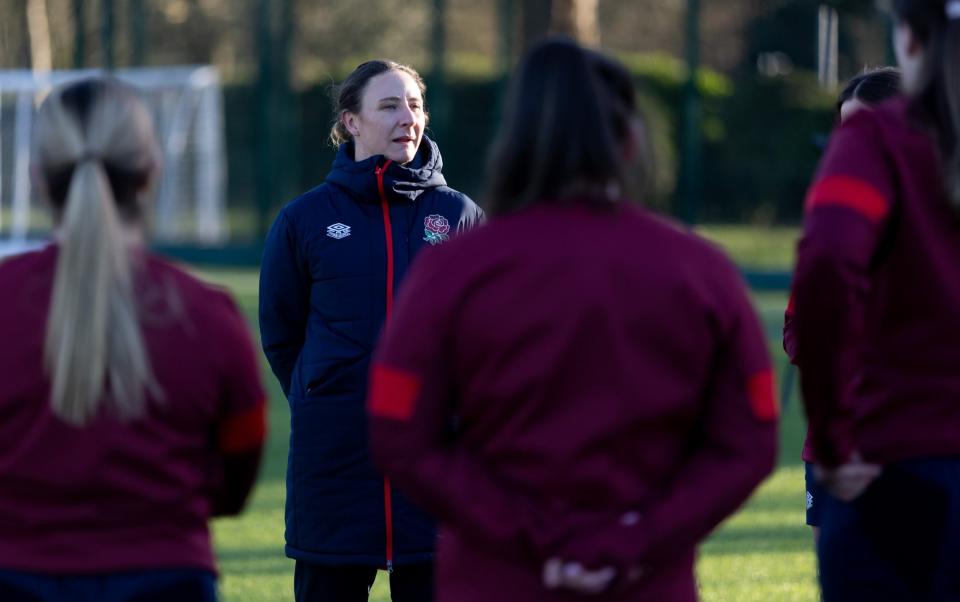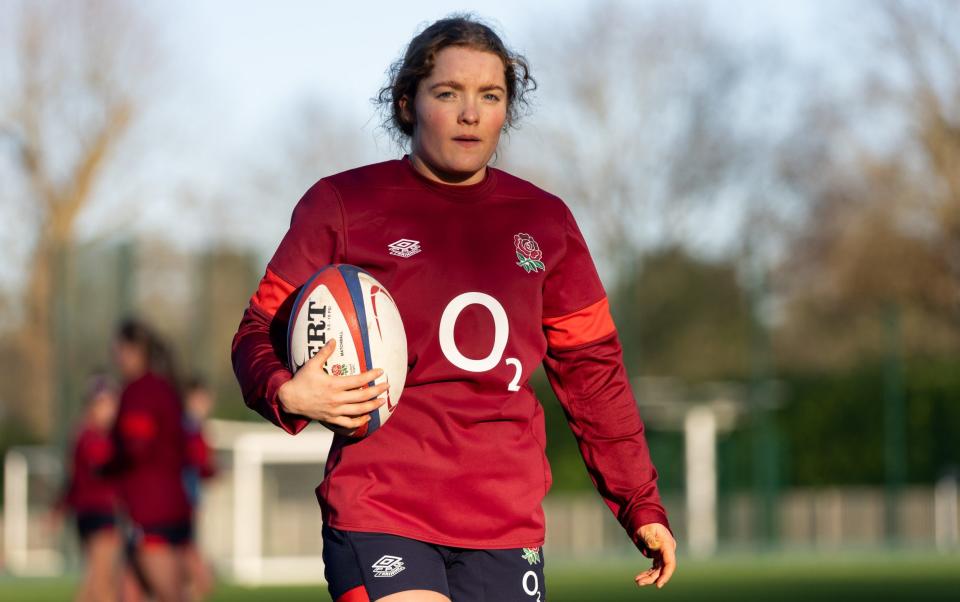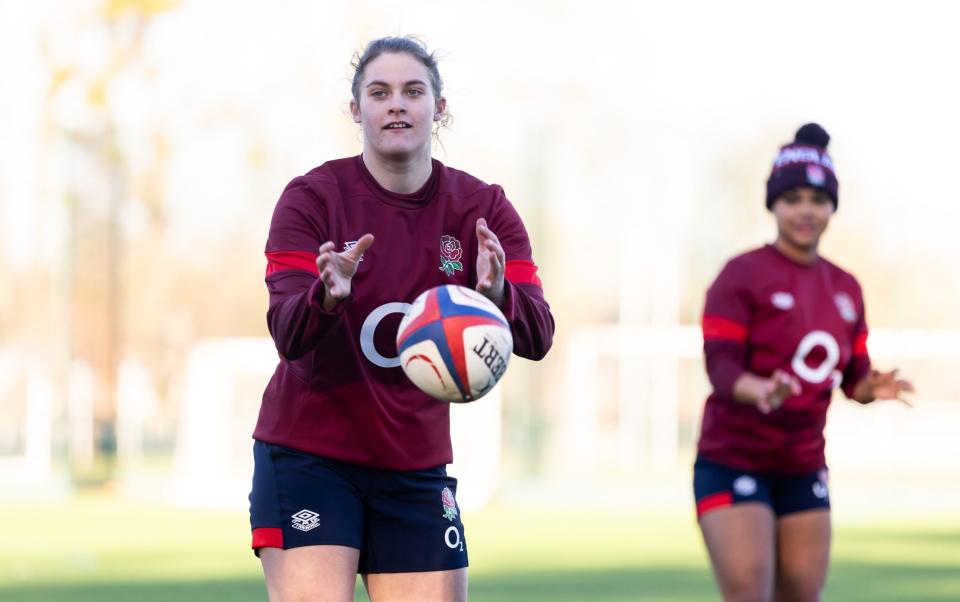Inside the Red Roses talent factory and the next generation of England stars

One by one, England players file out of an upstairs room at Bisham Abbey National Sports Centre and head for a nearby table tennis table. The group have just sat through an hour-long session about the importance of mindset and personal values, delivered by the Rugby Football Union’s pathway psychologist. Now, after an intense day of training, it is chill-out time.
Over in a corner, former England full-back Sarah McKenna watches on. “Back in my day, we would never have had this,” she says. “We all laugh at it, but that’s the reality. For the most part, the players don’t need to be reminded of it. They just need to enjoy this journey.”
McKenna is not talking about John Mitchell’s high-flying, world No 1 team. Over the past few months, she has been busy overseeing the talent factory churning out the next generation of Red Roses, having been appointed England Women’s Under-20s assistant coach last December.
Telegraph Sport recently met up with the squad during a three-day camp in Berkshire, where they are preparing for their slate of spring fixtures (they have since played the Army and face their French and Welsh counterparts in the coming weeks). Unlike the men’s game, there is no formal Women’s Six Nations at under-20 level, an age group where investment in the women’s game was once non-existent.
When McKenna was an age-grade athlete, playing opportunities were scarce. “We had games against Canada, Wales and the USA,” she recalls. “At the time, there were no other under-20s programmes in place. Nobody invested time or money into it. We played those three times and that was our year, done.”

A decade ago, the England women’s pathway programme was being run out of barracks at RAF Bovington in Dorset. LJ Lewis, the current England Women’s Under-20s head coach, still has “horror stories” of doing army-based drills near the site’s famous tank museum. Camps were focused on testing players’ mental resolve through character-building exercises rather than actual rugby.
How times have changed. Every member in this 32-strong “mini Red Roses” cohort at Bisham is attached to a club in Premiership Women’s Rugby, which is driving standards in the RFU’s female pathway. Training camps are meticulously organised, with an emphasis on nurturing players holistically. Along with psychological support, training is interspersed with recovery, analysis sessions and even nutrition workshops.
“The expectation from the players is massive,” says Lewis. “Given the facilities that are available to them at their clubs, they don’t want to be coming into an environment which is below that and feeling a step down. It needs to be a step up.”
McKenna agrees: “They’re getting 360[-degree] support from their clubs. Their knowledge is massive and they bring that, telling us what they’ve learnt at their clubs. In my day, we did all our learning in the under-20s as players. They’re so many steps ahead so we can focus on the rugby.”
Among the group is hooker Niamh Swailes, who has been busy racking up minutes this season for Sale Sharks. Hailing from a football family in Gateshead – her father is the former Premier League footballer Chris Swailes while her older brother was on the books at Newcastle United’s academy – she used to be a regional swimmer before switching to rugby in her teenage years.

“As a front-row, you’re at your peak in your late 20s,” says Swailes. “That’s what they say – it takes time to develop into that position. Especially being a small hooker such as myself. I’m just excited to see where my journey goes.”
Saracens scrum-half Tori Sellors, a former Great Britain handball player and national trampolinist who has been in the pathway since she was 17, has more pressing ambitions. “I’d quite like to make the World Cup next year,” she says. “But it’s only 18 months away. I’ve spoken to coaches and they’ve said if I want to push for it there’s an opening.”
When Steve Borthwick took over the England men’s team from Eddie Jones in December 2021, he inherited a pack that was light on secondary options, particularly at hooker. With PWR now drip-feeding talent into the national side, the Red Roses, who are light years ahead of most other nations when it comes to player depth, do not have such a problem.
That has prompted a more forensic approach in the women’s pathway, where previously female front-rowers have often been converted quite far down the line (England tighthead prop Sarah Bern switched from the back row months before the 2017 World Cup when she was already in the senior set-up). As a result, identifying positional talent sooner rather than later remains high up on Lewis’s to-do list and in Swailes and Sellors, she already has two success stories. The pair used to be flankers before making the switch to their current positions after their potential was spotted by James Cooper, the head coach of England Women’s Under-18s team.

“It was either putting on 10kg of pure, lean muscle mass or giving scrum-half a go,” says Sellors. “If you’re telling a 16-year-old girl to put on 10kg, most would think, ‘Do I really want to do that?’ Because you have to put loads on before cutting it down and keeping it on. I thought I had nothing to lose in trying something new.”
Even if Sellors does not make the cut for next year’s World Cup, Mitchell has already signalled his intent to involve England Under-20 players with his side’s preparations for the tournament, which would prove an invaluable experience.
“It’s a really exciting time for this age group,” says Lewis. “They’ve all got real potential of becoming full-time athletes in the game. With a home World Cup [next year] this age group has a real exciting opportunity to be part of a period of change.”

